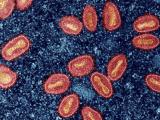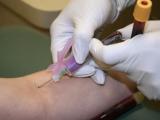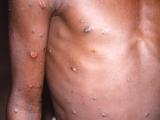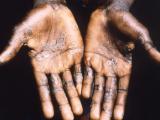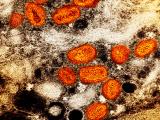The World Health Organization (WHO) today announced an end to the public health emergency of international concern (PHEIC) for mpox, which it declared in July 2022 in the wake of unprecedented international spread.
The decision comes as countries brace for a possible rise in cases as social events and other mass gatherings resume.
Steady progress with outbreak control
At a briefing today, WHO Director-General Tedros Adhanom Ghebreyesus, PhD, said the mpox emergency committee met yesterday to review the latest developments and recommended that the situation no longer represents a PHEIC. "I have accepted that advice," he said.
Countries have made steady progress with controlling outbreaks, and cases over the past 3 months have dropped 90% compared to the previous 3 months, he said. He credited the work of community organizations and public health departments to communicate the risks, encourage behavior change, and steer people to testing, vaccines, and treatments. "Pharmaceutical companies and regulatory agencies have also played an important role in helping to expand access to these countermeasures," he added.
Tedros said early in the outbreak, health officials braced for a backlash against affected communities, but a major one never materialized, for which officials are thankful.
However, Tedros said the work isn't over and that the virus continues to hit affected communities in all regions, including Africa, where mpox is endemic in some countries. He noted that travel-related cases highlight a continuing threat with ongoing risks, especially to people with untreated HIV infections.
There's understandable uncertainty about the probability of a large resurgence.
Nicola Low, MD, vice-chair of the WHO's mpox emergency committee and an epidemiology professor at the University of Bern, said at today's briefing that the epidemic has so far followed a large single epidemic curve that peaked in July and August, with an impressive decline. However, she noted small numbers of cases and smaller outbreaks in specific countries. "So there's understandable uncertainty about the probability of a large resurgence."
She said several knowledge gaps remain, including about modes of transmission, vaccine effectiveness, and that countermeasures are lacking in African countries where cases and transmission occur regularly.
The group agreed that the remaining challenges are best addressed by sustained long-term efforts rather than emergency measures that are part of a PHEIC. For example, Low recommended that mpox preparedness, prevention, and response be integrated into national control programs, including those for HIV and other sexually transmitted infections. "HIV infection is a major threat and the major risk factor for severe illness and death from mpox," she said.
Latest global mpox snapshot
In its latest situation report on mpox today, the WHO said 264 cases and 10 deaths were reported since its last update on Apr 27 and that weekly cases have jumped 64% compared to the previous week, mainly due to rises in two regions. In the Western Pacific, outbreaks are occurring in China, Japan, and South Korea. In the Americas, most new cases were reported from Mexico and Brazil.
The WHO said reporting is incomplete for African countries, so it's difficult to characterize the trend for the region.
One PHEIC remains in effect: polio
Given that the WHO ended the PHEIC for COVID-19 last week, the only one that remains is for polio. At the WHO briefing today, Mike Ryan, MD, who leads the WHO's health emergencies program, said the WHO is currently juggling 56 other graded health emergencies, including 14 that are at the highest level of grade 3.
Other current infectious disease threats include cholera, with outbreaks under way in 24 countries, and measles, he said. "The world is not quiet from the point of view of infectious diseases or health emergencies."



